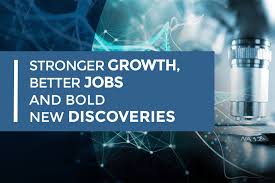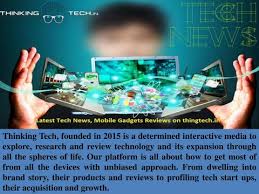The Latest Advances in Technology: A Glimpse into the Future
In today’s rapidly evolving world, technology continues to advance at an unprecedented pace, transforming the way we live, work, and interact. From artificial intelligence to quantum computing, recent innovations are not only reshaping industries but also redefining the possibilities of what can be achieved.
Artificial Intelligence and Machine Learning
Artificial Intelligence (AI) has become a cornerstone of modern technology. With machine learning algorithms becoming more sophisticated, AI systems are now capable of performing tasks that were once thought to be exclusive to human intelligence. From natural language processing to image recognition, AI is being integrated into various sectors such as healthcare, finance, and transportation.
In healthcare, AI is revolutionising diagnostics and personalised medicine. Algorithms can analyse medical images with remarkable accuracy, while predictive analytics help in crafting personalised treatment plans for patients. Meanwhile, in finance, AI-driven chatbots and robo-advisors are enhancing customer service and optimising investment strategies.
The Rise of Quantum Computing
Quantum computing represents a paradigm shift in computational power. Unlike classical computers that use bits as units of information, quantum computers utilise qubits which can exist in multiple states simultaneously. This allows them to solve complex problems at speeds unimaginable with current technology.
Although still in its nascent stages, quantum computing holds promise for breakthroughs in cryptography, materials science, and complex system simulations. Tech giants and startups alike are investing heavily in this field to unlock its full potential.
The Internet of Things (IoT)
The Internet of Things (IoT) is another technological marvel that is gaining traction. By connecting everyday devices to the internet, IoT creates a network where data can be shared seamlessly between devices. This connectivity enables smarter homes with automated lighting and heating systems as well as cities equipped with intelligent traffic management solutions.
IoT is also making significant strides in industrial applications through predictive maintenance and supply chain optimisation. By analysing data from connected machines, businesses can anticipate equipment failures before they occur and streamline operations for maximum efficiency.
5G Connectivity
The rollout of 5G networks marks a new era of connectivity with faster speeds and lower latency than ever before. This next-generation wireless technology promises to enhance mobile broadband services while paving the way for innovations like autonomous vehicles and augmented reality experiences.
With its ability to support massive numbers of connected devices simultaneously without compromising performance or reliability—5G will be instrumental in realising smart city initiatives around the globe.
Conclusion
The most current technologies are not just incremental improvements but represent transformative changes that will shape our future society profoundly—impacting everything from how we communicate globally down through individual daily routines within local communities worldwide!
Exploring the Impact and Challenges of Cutting-Edge Technologies: A Comprehensive FAQ Guide
- What is artificial intelligence and how is it being used in current technology?
- How does machine learning contribute to advancements in modern technology?
- What are the potential applications of quantum computing in various industries?
- How is the Internet of Things (IoT) changing the way we interact with technology?
- What impact will 5G connectivity have on future technological developments?
- Are there any ethical concerns surrounding the use of AI and machine learning in today’s technology?
- How can businesses leverage IoT to improve efficiency and productivity?
- What are some examples of innovative uses of augmented reality (AR) in current technology?
- What role does cybersecurity play in safeguarding advanced technologies like AI and IoT?
What is artificial intelligence and how is it being used in current technology?
Artificial intelligence (AI) refers to the simulation of human intelligence processes by machines, particularly computer systems. These processes include learning, reasoning, problem-solving, perception, and language understanding. In current technology, AI is being utilised across a multitude of sectors to enhance efficiency and innovation. In healthcare, AI algorithms assist in diagnosing diseases by analysing medical data with greater accuracy and speed than traditional methods. In the automotive industry, AI powers autonomous vehicles by enabling them to navigate and make decisions in real time. Additionally, AI is transforming customer service through chatbots that provide instant responses and personalised interactions. In finance, it helps detect fraudulent activities by identifying patterns that deviate from the norm. Overall, AI is becoming an integral part of daily life and business operations, driving advancements that were once considered futuristic.
How does machine learning contribute to advancements in modern technology?
Machine learning plays a pivotal role in driving advancements in modern technology by enabling systems to learn from data, identify patterns, and make decisions without explicit programming. Through sophisticated algorithms and neural networks, machine learning enhances automation, optimisation, and predictive capabilities across various industries. In fields such as healthcare, finance, and autonomous vehicles, machine learning algorithms are revolutionising processes by analysing vast amounts of data to deliver insights, improve efficiency, and drive innovation. By continuously refining its models based on new information, machine learning contributes to the evolution of technology by pushing boundaries and unlocking new possibilities for solving complex problems efficiently and effectively.
What are the potential applications of quantum computing in various industries?
Quantum computing holds immense potential for revolutionising various industries with its unparalleled computational power. In healthcare, quantum computing can accelerate drug discovery processes by simulating complex molecular interactions, leading to the development of more effective medications. In finance, it can enhance risk analysis and portfolio optimisation through faster and more accurate calculations. Additionally, quantum computing has the potential to transform cybersecurity by enabling the creation of unbreakable encryption methods. In logistics and supply chain management, quantum algorithms can streamline route optimisation and inventory management. The possibilities are vast, and as quantum computing continues to advance, we can expect to see groundbreaking applications across a wide range of industries.
How is the Internet of Things (IoT) changing the way we interact with technology?
The Internet of Things (IoT) is revolutionising the way we interact with technology by creating a seamless network of interconnected devices that communicate and share data in real-time. This interconnected web of smart devices, from household appliances to wearable gadgets, allows for unprecedented levels of automation and control. With IoT, everyday objects can be remotely monitored and controlled, leading to increased convenience, efficiency, and customisation in our daily lives. The ability to gather and analyse vast amounts of data from these connected devices also enables predictive maintenance, personalised experiences, and improved decision-making processes. Ultimately, IoT is transforming how we engage with technology by making our environments smarter, more responsive, and tailored to our individual needs.
What impact will 5G connectivity have on future technological developments?
The widespread adoption of 5G connectivity is poised to revolutionise future technological developments across various industries. With its significantly faster speeds and lower latency compared to its predecessors, 5G will enable the seamless integration of emerging technologies such as autonomous vehicles, augmented reality, and the Internet of Things (IoT). This heightened connectivity will not only enhance user experiences but also unlock new possibilities for innovation in areas like healthcare, smart cities, and manufacturing. By facilitating real-time data transmission on a massive scale, 5G is set to redefine how we interact with technology and pave the way for a more interconnected and efficient digital ecosystem.
Are there any ethical concerns surrounding the use of AI and machine learning in today’s technology?
The use of AI and machine learning in today’s technology indeed raises several ethical concerns that warrant careful consideration. One primary issue is the potential for bias in AI systems, as these technologies often learn from historical data that may contain existing prejudices or inaccuracies, leading to unfair outcomes in areas such as recruitment or law enforcement. Additionally, the deployment of AI can result in significant privacy concerns, given its ability to process vast amounts of personal data. There is also the fear of job displacement, as automation may replace roles traditionally performed by humans. Furthermore, the lack of transparency in how AI systems make decisions can lead to accountability issues, making it difficult to determine who is responsible when things go wrong. Addressing these ethical challenges requires a collaborative approach involving policymakers, technologists, and society at large to ensure that AI and machine learning are used responsibly and equitably.
How can businesses leverage IoT to improve efficiency and productivity?
Businesses can leverage the Internet of Things (IoT) to enhance efficiency and productivity in various ways. By incorporating IoT devices into their operations, companies can monitor and track equipment performance in real-time, enabling predictive maintenance to prevent costly breakdowns. IoT sensors can also streamline inventory management by providing accurate data on stock levels and automatically triggering reorders when supplies run low. Furthermore, by analysing the data collected from IoT devices, businesses can gain valuable insights into consumer behaviour, operational patterns, and market trends, allowing them to make informed decisions that drive growth and optimise processes for maximum efficiency.
What are some examples of innovative uses of augmented reality (AR) in current technology?
Augmented reality (AR) has opened up a realm of innovative possibilities across various industries. In current technology, we see compelling examples of AR being utilised in diverse ways. One prominent application is in the field of education, where AR enhances traditional learning experiences by overlaying digital content onto the physical world. In retail, AR is transforming the way customers shop by allowing them to virtually try on clothes or visualize furniture in their homes before making a purchase. Additionally, in healthcare, AR is revolutionising medical training through interactive simulations and aiding surgeons with real-time data during procedures. These are just a few instances showcasing the impactful and creative uses of augmented reality in today’s technological landscape.
What role does cybersecurity play in safeguarding advanced technologies like AI and IoT?
Cybersecurity plays a crucial role in safeguarding advanced technologies such as AI and the Internet of Things (IoT) by protecting sensitive data, ensuring system integrity, and maintaining user privacy. As these technologies become increasingly integrated into everyday life and critical infrastructure, they present new vulnerabilities that can be exploited by malicious actors. Effective cybersecurity measures are essential to defend against threats such as data breaches, hacking, and cyberattacks. By implementing robust security protocols, encryption techniques, and continuous monitoring systems, organisations can mitigate risks and ensure the safe deployment of AI and IoT solutions. Furthermore, cybersecurity helps build trust among users and stakeholders by demonstrating a commitment to protecting their information in an interconnected digital landscape.


